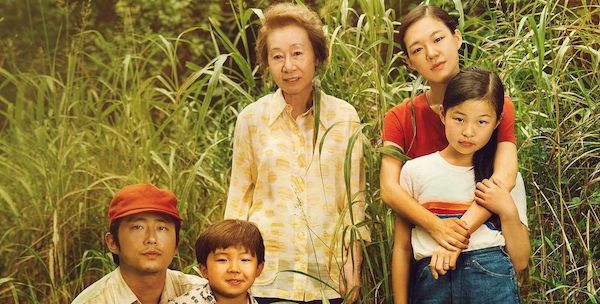Film Commentary: “Minari” — An Immigrant Tale with a Southern Accent
By Jeremy Ray Jewell
Minari is about the triumph of folkways, both Ozark and Korean.

The Yi Family in Minari. Photo: A24.
Multiple Academy Award nominee Minari (currently screening at the Kendall Square Cinema) is American grown. The film, which won one Academy Award (Best Performance by an Actress in a Supporting Role) and was nominated for five others, was written and directed by an American, Lee Isaac Chung, and stars mostly American actors, notably Steven Yeun. But, when the movie was nominated in the Best Foreign Language Film category at the Golden Globes (it won the award), many critics condemned where it has been slotted. The Hollywood Foreign Press Association (HFPA) rules relegated The Farewell (2019) to the same Foreign Language Film category: the requirement is that any film with 50% or less of its dialogue in English cannot compete for Best Drama or Musical/Comedy, nor for any of the other valued awards. This numerical breakdown has been rightly critiqued because of how it penalizes diversity and representation. Less remarked is how Minari dismantles Hollywood cliches about immigrants, which the industry tends to like to be lily white. In addition, Tinsel Town likes its South looking backwards and racist. Minari rejects both caricatures for the sake of reflecting reality rather than audience pleasing prejudices.
Because of its Korean characters, the depiction of Southernness in Minari has been largely overshadowed (or should we say largely ignored). Yet the region and its people are a fundamental part of the tale, and to its credit it does not serve up the stereotypical South that the film industry has customarily demanded. This isn’t the stagnant South of the arrested imagination, neither Mississippi Burning (1988) nor Gone With the Wind (1939), bedeviled by a legacy of backwardness that must yield to the moral high ground demanded by other parts of the country. Minari presents the real South,a region largely defined by its abrupt ruptures from the past. Here Korean immigrants embrace an Ozark dream — like their hillbilly neighbors — that is as much about farming as it is about getting into Heaven. But this is also a South where the dream is being increasingly squashed by agribusiness as well as corporations that are relocating elsewhere to exploit cheaper, unorganized labor. As Yuen’s character, Jacob, yells, “Korean people, big city, you never trust them!” This is a profound moment: as Yeun’s character, Jacob, a non-white immigrant, is articulating a feeling that is profoundly Middle American. Yet it is a sentiment that is routinely dismissed as white rural backwardness when it is articulated in other films.

A scene from Minari. Photo: A24.
Unsurprisingly, religion is also treated with clear-eyed respect. When young David looks at on Korean War vet Paul carrying his cross down the road, he hears the kids on the church bus repeat the same condescending insults that have often targeted rural communities of faith: “There’s that cross guy… I heard he got dirt floors and he shits in a bucket. He got no water where he lives.” Of course David, though he scoffed at his Korean grandmother’s ways — knowing nothing of the family’s struggles in Korea — no doubt recalls a time when he had no water in his house. Initially, the Korean family eschewed the Ozark/Appalachian folk practice of water dowsing in favor of “using their minds.” At the end of the film, they utilize the ritual to divine the best location for a new well. There’s no victory of the white savior here. This is about the triumph of folk ways, both hillbilly and Korean. And, like the symbolic minari plants — which in her wisdom grandma plants in just the right place — the Yi family has planted itself in the right place:“That be where it is,” says Paul. The forked dowsing stick is guided — by the power of tradition, community, and family — to the perfect spot.
This is not a film about immigrants as gangsters, in the mode of The Godfather. Its protagonists aren’t white, and that it what sets Minari apart from conventional Hollywood fare. It does not revolve around an action formula, featuring immigrants fighting against endless prejudice and discrimination. Instead, this film demonstrates something that many of the comfortable, privileged, and white in this country are unprepared to accept: not only is Middle America looking quite different these days, but that this diversity is more harmoniously global than what can be found in Manhattan or Malibu.
Jeremy Ray Jewell hails from Jacksonville, FL. He has an MA in History of Ideas from Birkbeck College, University of London, and a BA in Philosophy from the University of Massachusetts Boston. His website is www.jeremyrayjewell.com.

Excellent review Jeremy. As a Korean American who spent part of his childhood in Texas in the 80’s I couldn’t agree more.